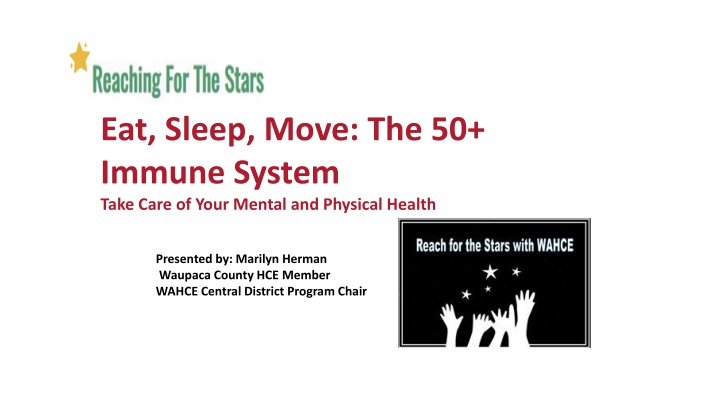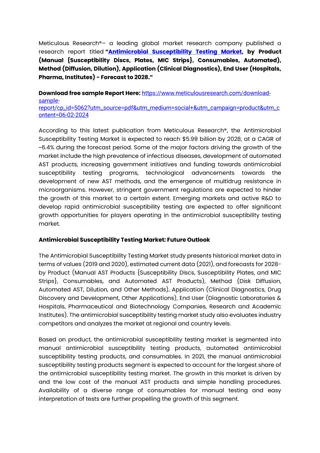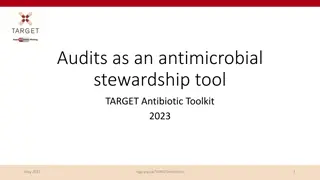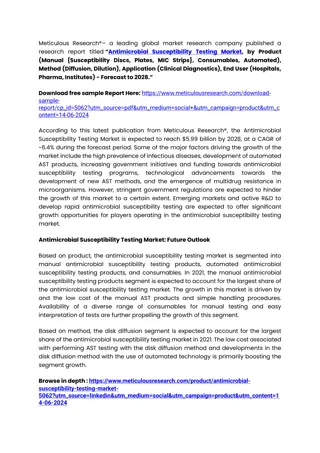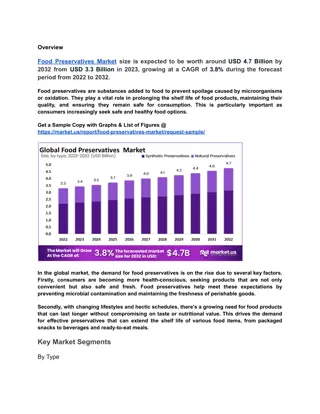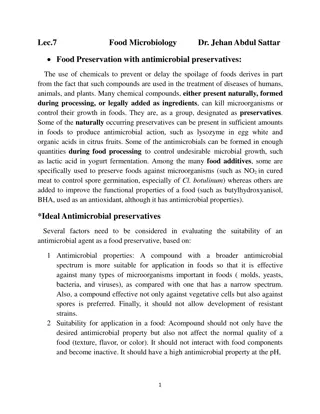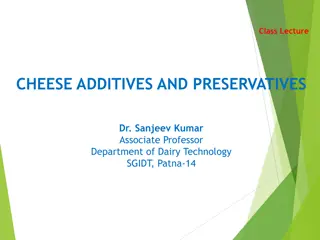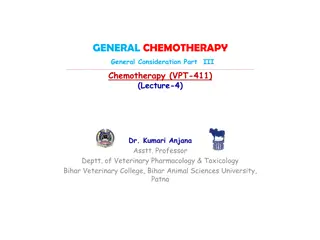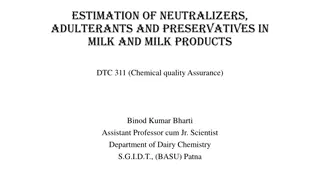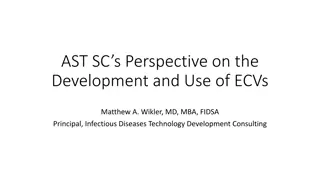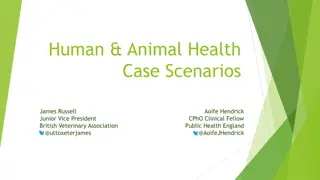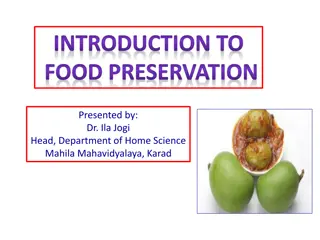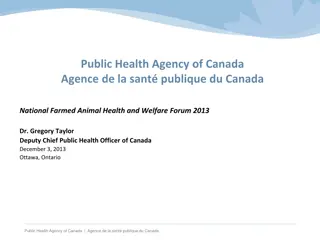Food Preservation with Antimicrobial Preservatives
The use of antimicrobial preservatives in food preservation is crucial for preventing spoilage and ensuring food safety. Various chemical compounds with antimicrobial properties are utilized to control microbial growth in foods. Factors such as antimicrobial spectrum, suitability for application in food, and regulatory compliance are essential in evaluating the effectiveness of antimicrobial agents as food preservatives.
Download Presentation

Please find below an Image/Link to download the presentation.
The content on the website is provided AS IS for your information and personal use only. It may not be sold, licensed, or shared on other websites without obtaining consent from the author.If you encounter any issues during the download, it is possible that the publisher has removed the file from their server.
You are allowed to download the files provided on this website for personal or commercial use, subject to the condition that they are used lawfully. All files are the property of their respective owners.
The content on the website is provided AS IS for your information and personal use only. It may not be sold, licensed, or shared on other websites without obtaining consent from the author.
E N D
Presentation Transcript
logo image 5 Eat, Sleep, Move: The 50+ Immune System Take Care of Your Mental and Physical Health Presented by: Marilyn Herman Waupaca County HCE Member WAHCE Central District Program Chair
Six Pillars of Brain, Body, Mind Health Six Pillars of Brain, Body, Mind Health 2021 Wisconsin PBS University Place Program Ways to Reduce Risk for Alzheimer's Disease presented by Nathaniel Chin, Medical Director of the Wisconsin Alzheimer's Research Center https://www.adrc.wisc.edu/prevention. Watch the entire program on-line. Program Take-Away for Me The definition of normal changes with age What do you identify as symptoms of aging We grow new brain cells and more connections throughout our life!
Six Pillars of Brain Health Six Pillars of Brain Health Physical Activity Food We Eat Sleep Cognitive Ability Social Activity Stress Reducing Activity
The Brain, Nerves and Cognitive Ability Brain has many functions oMemory (short and long term) oReasoning oMotor skill control oBasic life systems Normal to have some changes with age oInflection point of 60-65 years old for all people oGenes play a role oAfter age 50, we lose 1% of muscle mass each year oCan start to see changes start around 30 years old
The Brain, Nerves and Cognitive Ability Cognitive Ability and changes oFirst to notice episodic memory and processing speed oLeast likely to see speech, language and procedural memory oOver time, we are able to increase our vocabulary, knowledge and wisdom for as long as we live. Good reason to keep on learning, Remember, cognitive changes are normal to the aging process. This is why we can make changes or intervene for improvement.
Risk Factors for Dementia or Alzheimer's Risk Factors for Dementia or Alzheimer's Modifiable Conditions Depression Hypertension Obesity Smoking High Cholesterol Diabetes Inflammation Physical Inactivity Kidney Dysfunction Heart Disease % Impact Lifestyle Control
Risk Factors for Dementia or Alzheimers Risk Factors for Dementia or Alzheimer s Modifiable Conditions Depression Hypertension Obesity Smoking High Cholesterol Diabetes Inflammation Physical Inactivity Kidney Dysfunction Heart Disease % Impact 85% 81% 60% 59% 54% 47% 45% 39% 39% 36% Lifestyle Control
Risk Factors for Dementia or Alzheimers Risk Factors for Dementia or Alzheimer s Modifiable Conditions Depression Hypertension Obesity Smoking High Cholesterol Diabetes Inflammation Physical Inactivity Kidney Dysfunction Heart Disease % Impact 85% 81% 60% 59% 54% 47% 45% 39% 39% 36% Lifestyle Influence Less Education, Mental Health Care Hearing Loss Hypertension Obesity Smoking Depression Hearing Loss, Inactivity Isolation Diabetes All the Above
FOODS WE EAT FOODS WE EAT - - MEDITERRANEAN, DASH OR THE MIND Diet MEDITERRANEAN, DASH OR THE MIND Diet Mediterranean Diet lowers inflammation, reduces heart disease risk, reduces diabetes risk, increases weight loss DASH Diet (Dietary Approach to Stop Hypertension) developed at Mayo Hospital and approved by the National Heart, Lung and Blood Institute reduces risk of heart disease, high cholesterol, hypertension, obesity MIND Diet is built on both of the above diet plans and goes a step or two further keeping brains younger by 7 years!
MIND Lifestyle ( Mediterranean and DASH) Reasons it works oDecreases rate of heart disease and vascular disease oDecreases markers of inflammation oDecreases rate of diabetes oHelps with weight loss and/or maintenance oAssociated with longer life span in this region All areas of the Mediteranean Sea region oNot just Italy and Greece influences oTurkey, Isreal, Lebanese, Egyptian, Moroccan, North Africa and Spain
Foods and Drinks That Strengthen Your Foods and Drinks That Strengthen Your Immune System Immune System Water Citrus Fruits Garlic Turmeric or Cinnamon Fermented Foods Spinach Chicken Noodle Soup Red Bell Peppers Nuts Eggs Apples
Foods and Drink That Weaken the Immune Foods and Drink That Weaken the Immune System System Alcohol Excess Sugar Processed Foods
PHYSICAL ACTIVITY PHYSICAL ACTIVITY 150 300 MINUTES PER WEEK (AEROBIC (movement that still allows you to talk to someone while moving) By age 50 we lose 1% muscle mass per year More activity means more blood flow Higher exercise means increased brain health (amyloid gunk buildup is far less if you are active) Improves cardiorespiratory fitness Improves depression, anxiety and stress Reduces blood pressure, improves sleep Improve weight management, appetite control
SLEEP SLEEP Improved mood, reduced stress Lowers high blood pressure Lowers risk of heart disease Helps with weight management Increases immune system function Reduces inflammation Improves learning, memory, decision making, puts memories in storage, cleans out protein build-up RESTORATIVE SLEEP 7-9 HOURS
STRESS REDUCING ACTIVITY STRESS REDUCING ACTIVITY Fight or Flight feelings take a heave toll on the body, mind and spirit Find your motivation to achieve new goals or maintain older ones Uncontrolled stress results in increased cortisol hormones (stores fat in your mid-section), increased inflammation, metabolic disruption (pre-diabetes), changes in blood vessel walls becoming more rigid Repetitive Negative Thinking like worry, fretting, mulling decisions over and over fosters cognitive decline
COGNITIVE ACTIVITY COGNITIVE ACTIVITY COGNITION IS BRAIN FUNCTION It includes attention, thinking, memory, visual, language, performance At age 30 cognition decline start Tipping point is 60-65 years Most decline in episode memory and processing speed Least decline in speech, language processing, procedural memory Increased ability in vocabulary, wisdom, resilience Researchers found a 33% increase in Alzheimer's if a person was not cognitively engaged
SOCIAL ACTIVITY SOCIAL ACTIVITY Slows Cognitive decline by 50% Be Aware and Purposeful in what and why we do things Social activity comes at the risk of catching a virus colds, flu, pneumonia, RSV, COVID Give your immunizations a greater chance of protecting you Make sure HCE is full of Fellowship, Fun, Friends, Food and a Look to the Future
Why Join HCE? Why Join HCE? IT S GOOD FOR YOUR HEALTH YOU MEET NEW FR ENDS YOU MAKE NEW CONTACTS YOU LEARN NEW SK LLS T S GOOD FOR THE COMMUN TY YOU CAN FOLLOW YOUR NTERESTS YOU CAN BU LD UP YOUR EXPERIENCE YOU LEARN HOW TO W N YOUR BATTLES YOU CAN MAKE A CONTR BUT ON T S GOOD FOR THE COUNTRYAND OUR WORLD
How Do I Begin? Keep It Up? How Do I Begin? Keep It Up? Eating Don t stress eat. Buy and stock healthy foods Choose highly process foods or sweetened beverages less often Try more salads, vegetables and fruit Exercise Sitting is the new Smoking (cost for sitting, watching TV, reading has a health cost) Set realistic exercise goals. Increase intensity, time and duration Brisk walking for 60 minutes a week or 40 minutes 3X a week refreshes the white matter in your brain (brain storage) If active, you do better on cognitive and memory tests *Colorado State University Study on Memory and Thinking
How Do I Begin? Keep it Up? How Do I Begin? Keep it Up? Cognitive Activity Find enjoyable but challenging activities Invite someone else for an outing Talk to others, make a new friend Volunteer at the time, intensity, frequency that fits you Find intentional activity that help you unwind Be mindful art, music, pets, walking, keep a grateful journal, new hobbies Sleep Reduce blue light activities (This fools your eyes into thinking its daylight) Alcohol interrupts sleep Limit fluids before bed Keep bedroom cool and dark Get up at the same time, change your bedtime if you feel tired
Changing a Bad Habit? Changing a Bad Habit? It s impossible, said pride. It s risky , said experience. It s pointless, said reason. Give it a try , whispered the HEART. You Got This ! Keep Trying Keep Inspiring Keep Moving Keep Helping Keep Believing Keep Dreaming Keep Hoping Keep Loving
Changing a Habit is not Easy DO SOMETHING By Action leading to Inspiration to Motivation for more Action SMART oSpecific oMeasurable oAchieveable oRealistic oTimes oTake 18-250 days to form Action Motivation Inspiration
You Cant Wait Until Life Isn t Hard Anymore Before You Decide To Be Happy Jane Nightbird in the Song It s OK performed on America s Got Talent 2021
Resources to Follow up with Wisconsin Alzheimer s Research Center www.adrc.wisc.edu/prevention Video with all study and research info Dementia Matters www.adrc.wisc.edu/dementia-matters James Clear, Create Healthy Habits
